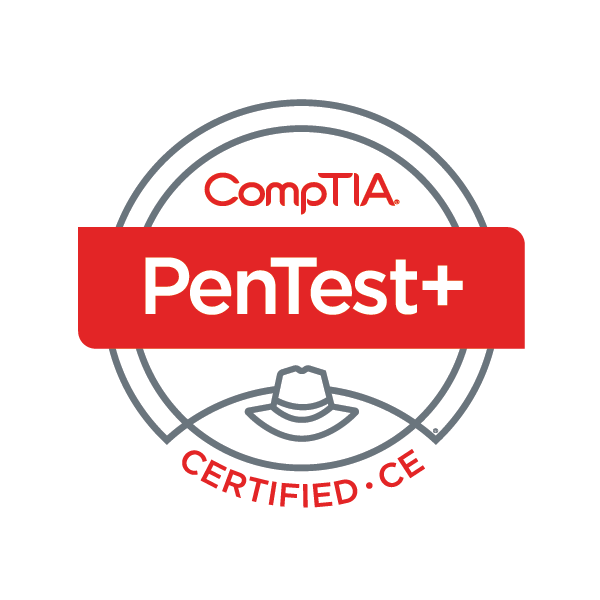Got the PenTest+ CompTIA Certification
How I Mastered CompTIA PenTest+ (PT0-002) Certification - Discover My Winning Study Strategy!
Why Choose the PenTest+ by CompTIA
In the expansive landscape of cybersecurity certifications, CompTIA stands as a notable provider, offering a diverse array of certifications addressing different facets of IT security. Among these offerings, the CompTIA PenTest+ certification holds significance for professionals aiming to validate their proficiency in penetration testing. There are three versions of the exam, with (PT0-002) being the newest.
CompTIA PenTest+ (PT0-002) is designed to validate the skills and knowledge necessary to plan, execute, analyze, and document penetration tests comprehensively. It encompasses various aspects of penetration testing, such as planning and scoping, information gathering, vulnerability identification, exploitation techniques, and post-exploitation procedures.
The examination evaluates candidates through a combination of multiple-choice questions and performance-based tasks. Candidates are tested on their ability to execute penetration testing tasks within hypothetical scenarios. These assessments gauge competencies in ethical hacking, vulnerability assessment, and risk management, all of which are critical skills in the cybersecurity domain.
I opted for the PenTest+ (PT0-002) certification due to its intermediate level of expertise required. It falls between the relatively straightforward CC or Security+ certifications and the more challenging OSCP certification. As my first certification, it appears to be a suitable starting point. Additionally, I appreciate its emphasis on penetration testing compared to the also intriguing CISSP certification. The fact that it does not necessitate extensive work experience further influenced my decision. I am inclined towards continuous learning, even after completing university.
Preparation for the Exam
Preparing for any exam requires a structured approach. I created a learning plan, researched the study materials used by others, and sought out free learning resources. I obtained the exam bundle, which included the self-guided study book, and watched highly ranked YouTube videos on PenTest+ to gain valuable insights into the exam format. Additionally, I viewed lengthy videos demonstrating the use of hacking tools like nmap, Metasploit, and Nessus by completing TryHackMe rooms.
In addition to reading the official study guide cover to cover, I also skimmed through the PenTest+ for Dummies book. To facilitate active recall, I utilized a Quizlet deck and Anki flashcards. While I only clicked through the Quizlet cards, I made sure to memorize all the answers for the Anki flashcards. You can access my updated Anki deck here, which is an improved version of this one. I ensured to understand the distinctions between SQL blind, stacked, and error-based attacks, as well as the differences between reflected XSS and DOM-based XSS.
Another significant aid was the example questions I found through Google, which I reviewed twice. Utilizing practice exams helped me assess my readiness and pinpoint areas needing further review. Leveraging multiple resources enhanced my comprehension and retention of key concepts.
I immediately booked the exam to establish a fixed deadline when I began studying. I was able to dedicated one hour of study time each workday, reducing my work hours by that amount, starting one month before the exam. I dedicated 1-2 hours of study time per day, occasionally skipping study sessions on holidays, and on weekends, I often devoted more time to preparation. Estimating my total study time is challenging, but I believe I invested approximately 60 hours in preparation.
The Exam Day
I scheduled the exam at a test center for 10 AM, a time when I am mentally at my sharpest. Upon arriving 15 minutes early, a representative from the test center informed me that Pearson VUE, the exam platform manager, was experiencing technical difficulties. It was uncertain whether the exam could proceed as planned today. After a 30 minute wait, I received confirmation that I could begin the test. The individuals I interacted with were very friendly, which helped keep me in a relaxed mood.
As a native German speaker, I was allocated some extra time for the exam. I had a little over 3 hours to tackle all the questions. I commenced with the performance-based questions (PBQs) at the beginning, answering everything in sequential order while marking the ones I was unsure about. After completing all the questions, I had ample time remaining to review each one thoroughly. Subsequently, I conducted a third round of review, focusing solely on the questions I had doubts about. Sometimes, later questions provided hints to answers for previous ones. For instance, a question about an Nmap flag might indirectly be answered later when you encounter a question containing an Nmap command result with that specific flag. After this third review, I still had an hour left and concluded the exam ahead of schedule.
You will get the result if you passed right away!

What I Would Do Differently
Looking back, I realize there were some missteps in my preparation process. The self-study guide purchased for around $200 didn’t quite deliver the value I was hoping for. In hindsight, I would advise against investing in it and instead recommend opting for the Pentest+ for Dummies book, which, in my opinion, is a much better resource.
As for the Quizlet cards, they didn’t quite hit the mark for me. The deck felt overwhelming and didn’t contribute much to my preparation. I would recommend purchasing a Udemy course that includes sample exams, such as this one. Additionally, some of these courses offer discounts on the exam, providing a comprehensive and cost-effective preparation option.
So all you need is:
The journey towards CompTIA PenTest+ certification presented valuable learnings. Preparation involves utilizing a variety of study resources, gaining hands-on experience, and practicing with exam simulations. Looking ahead, the next goal is to pursue the Offensive Security Certified Professional (OSCP) certification, further advancing skills in offensive security and penetration testing.